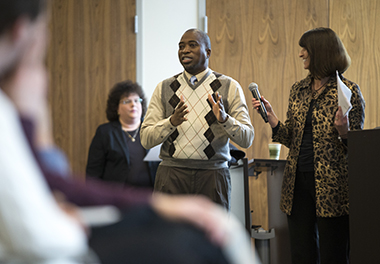Filling in Our Report Card
A town hall engages the University community in the reaccreditation process.
 |
|
Ekow King and Martha Asselin, co-chairs of committee looking at how the University supports the student experience, discuss their progress at a town hall meeting of the Middle States self study steering committee. (Photo by Patrick Dodson) |
ALBANY, N.Y. (Dec. 4, 2018) — More than 100 faculty, staff and students gathered in the Board Room of the Campus Center on Nov. 27 for an update on the University’s reaccreditation self-study process and the chance to provide feedback on the study’s draft outline.
The self-study is one of the requirements to maintain accreditation from the Middle States Commission on Higher Education (MSCHE). Institutional accreditation is an important component of assuring students and the public of the integrity of a postsecondary institution’s educational offerings. Accreditation is also required for a university to maintain degree granting status and to be eligible for its students to receive federal financial aid. Currently, 41 percent of UAlbany’s students are eligible to receive Pell grants from the Federal government.
Jeanette Altarriba, vice provost and dean for Undergraduate Education, and Jason Lane, interim dean of the School of Education, are the co-chairs of the self-study steering committee, and led the meeting. They informed those gathered about the important role of accreditation and the process that is being used to construct the self-study, with Altarriba highlighting that “the University’s strategic plan will play a significant role in guiding the self-study, with a particular focus on examining how the University will advance our strategic priorities.”
The self-study will be largely developed by working groups comprised of faculty, staff and students who will address the seven standards of accreditation set forth by Middle States. The heads of those seven working groups shared the outlines of their portions of the self-study with the town hall participants and invited feedback from the University community.
Lane shared with the group that “This self-study is the University at Albany’s report card, and we want to make sure that it reflects the collective wisdom, interests and concerns of our academic community.” He also invited students, faculty and staff to share their input with the groups working on the self-study.
More about the accreditation process can be found on the University wiki at https://wiki.albany.edu/display/middlestates2020/Middle+States+2020+Home. Members of the campus community are invited to send questions or concerns about the process to [email protected].
Future Town Hall meetings will be scheduled during the Spring 2019 semester.
![]() For more news, subscribe to UAlbany's RSS headline feeds
For more news, subscribe to UAlbany's RSS headline feeds
A comprehensive public research university, the University at Albany-SUNY offers more than 120 undergraduate majors and minors and 125 master's, doctoral and graduate certificate programs. UAlbany is a leader among all New York State colleges and universities in such diverse fields as atmospheric and environmental sciences, business, education, public health,health sciences, criminal justice, emergency preparedness, engineering and applied sciences, informatics, public administration, social welfare and sociology, taught by an extensive roster of faculty experts. It also offers expanded academic and research opportunities for students through an affiliation with Albany Law School. With a curriculum enhanced by 600 study-abroad opportunities, UAlbany launches great careers.


